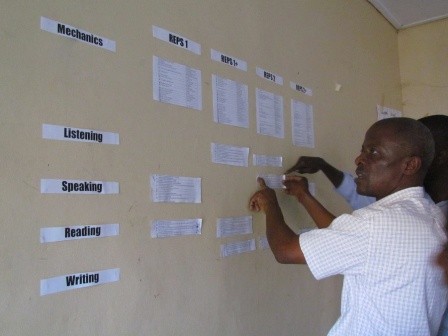
In 2008, francophone Rwanda instituted an audacious education policy to support its development goals. The government purported that shifting from French to English was key to regional and global business and trade, as was joining the anglophone East African Community and the Commonwealth of Nations.
When English became the language of instruction in all public schools, it took on great importance and urgency. While some teachers, like Mukamanzi Jane Rose, studied under an anglophone system, many others were primarily francophone, and struggled to adapt. Teachers like Rose, who later became a school principal, helped where possible.
"I looked at those who were weak … then I got a teacher who was performing and who had experience to help those teachers," says Rose of her experience as a principal in Huye district, southern Rwanda.
To institutionalize support for English, the Rwandan Government, supported by USAID and partners, has rolled out a school-based mentoring program which began in 2012 and is expected to be integrated into the Rwanda Education Board for the long-term. Senior mentors supervise and cascade training down to school-based mentors, who work directly with teachers at two schools. After nearly three years teaching English and history and two years serving as a principal, Rose is now a school-based mentor.
To assist mentors in providing targeted English training, USAID supported the development of English proficiency standards, performance indicators, and assessment and diagnostic tools. The first set of tools are for teachers' self-assessment, to provoke reflection on areas of confidence or improvement. Diagnostic tools—informal language tests—help mentors identify teachers' actual language levels. Those tools identify areas for further training as well as to motivate teachers as they progress through language levels.
Mentors across the country will be using these tools over the coming months as the mentor program takes shape. Rose has high hopes.
"If this mentoring system continues," she says, "in five, six years, Rwanda is going to be at the same level as other countries using English as the language of instruction."
Support for the school-based mentoring program is part of USAID's five-year Literacy, Language and Learning (L3) initiative, implemented by the Education Development Center. The initiative, which began in 2011, seeks to improve early-grade literacy and numeracy skills of Rwandan children by enhancing the quality of teaching and learning materials across the country.







Comment
Make a general inquiry or suggest an improvement.